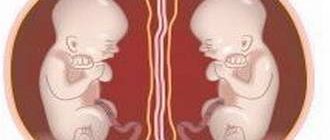Fetus
A tiny sperm reaches the egg and the process of development of a new organism has already begun. At the beginning of the 1st trimester, these are just two cells, which by the 13th week turn into a small man, reaching 9 cm in length and weighing about 20 grams. Perhaps his body is not yet so proportional, but this tiny organism already contains the building blocks of all organs and systems. The placenta begins to form.
From the 5th week, the baby’s heart is already beating. By the 8th - he makes his first hesitant attempts to move his arms and legs. And from the 11th week, using ultrasound devices, it is already possible to record his respiratory movements.
Basic nutrition rules
The purpose of the diet in the first trimester of pregnancy is to provide the mother’s body with the building material necessary for the formation of the child’s main organs.
In addition, the diet, which should be followed from the first days of pregnancy, is designed to provide the female body with vitamins and microelements, normalize the functioning of the digestive tract and prevent or reduce the manifestations of early toxicosis.
To ensure that your unborn child does not suffer from nutritional deficiencies, you should not adhere to the principle of “eating for two”; you just need to provide your body and the embryo with complete but healthy food.
The energy value of the diet in the first 14 weeks is 2400-2700 kcal.
The protein content in the daily diet should be 110-120g (equally proteins of plant and animal origin), of which
- 25% comes from meat and fish,
- 20% on dairy products,
- 5% is allocated to eggs.
The carbohydrate content should not exceed 350g, and fat 75g.
Diet
The diet in the first trimester should be divided, meals should be frequent, up to 5-6 times a day and in small portions.
Firstly, it promotes better digestion of foods and absorption of nutrients.
Secondly, frequent snacking prevents overeating and excessive weight gain.
Thirdly, they smooth out the symptoms of toxicosis.
In addition, split meals normalize intestinal function and ensure regular bowel movements. The last meal should not exceed 2-3 hours before going to bed.
Cooking
Diet in the first trimester is about ensuring healthy nutrition, so food should be boiled, baked or steamed. Fried foods increase the already increased load on the stomach and liver and are worse absorbed and digested. In addition, with the specified methods of cooking, the vitamins necessary during pregnancy are preserved in it as much as possible.
Food temperature
The temperature of food consumed corresponds to the standard diet No. 15 according to Pevzner.
Food should not be too hot, more than 60°C, or too cold, less than 15°C. Hot or cold food irritates the stomach, disrupts digestion and is less digestible. In addition, a violation of the temperature regime does not contribute to appetite, which is important for nausea.
Free liquid
Free fluid intake should not exceed 1.5 liters per day. Excessive drinking increases the load on the kidneys. You should avoid drinking strong tea and coffee, which promotes spasm of blood vessels and increases blood pressure (can lead to miscarriages).
Consuming salt
The amount of salt should not exceed 5-6 grams per day. Its excess increases thirst, leads to fluid retention in the body and edema, and adversely affects the urinary system.
Alcohol
Alcohol is strictly contraindicated during pregnancy, especially in the first trimester. Consumption of alcoholic beverages disrupts the formation of the main organs and systems of the fetus, which leads to severe congenital defects that are incompatible with life and termination of pregnancy.
Vitamins in the first trimester
Vitamins are of great importance in the first trimester. Therefore, you should eat plenty of fresh vegetables and fruits.
Firstly, it is plant fiber, which is beneficial for the normal functioning of the intestines, and, secondly, it is a storehouse of vitamins and minerals.
Folic acid is important in the formation of the nervous system of the embryo, calcium is needed for the formation of the bone skeleton and teeth, vitamin D for the prevention of rickets, phosphorus is necessary for the brain, iron prevents anemia, magnesium, vitamin E and B6 prevent abortion, iodine affects the intellectual development of the child after birth.
Mother's condition
As a rule, until 3 weeks of pregnancy (the first week of missed menstruation), a woman has no idea about her situation. Her condition is comparable to the sensations before the onset of the expected menstruation. However, menstruation does not come, and unusual new symptoms keep appearing and growing:
- Food cravings;
- Aversion to certain aromas and smells;
- Breast engorgement;
- Drowsiness and mood lability.
Toxicosis can cause the greatest discomfort in the first trimester of pregnancy
. Nausea and vomiting in the morning are not very pleasant.
Information Sometimes these manifestations of toxicosis can occur more than 3-4 times a day. Then the woman is recommended to be under medical supervision to monitor the condition until recovery. Physiologically, toxicosis recedes by 12-13 weeks, when the placentation process ends.
Starting from the very beginning of the 1st trimester of pregnancy, the first changes occur in the uterus, preparing this organ for bearing a fetus. During the process of its growth, due to the thickening and lengthening of the uterine ligaments, a woman may feel a slight stretching on the sides of the lower abdomen. By the end of the first trimester, the uterus protrudes above the symphysis pubis. In some expectant mothers, if you look closely, you can see a rounded tummy.
Nutrition menu for pregnant women at 1 trimmeter
The following menu can be considered optimal for the 1st trimester:
- Breakfast. Low-fat cottage cheese, grated apple or carrot, 2-3 cookies or crackers.
- Lunch. A sandwich with cheese, a cucumber or tomato, dried fruits, and a glass of yogurt as a drink.
- Dinner. Soup, green salad, piece of stew or mashed fish, vegetables, rice.
- Afternoon snack. Cheesecake, casserole, sandwich, fruit drink, yogurt.
- Dinner. Fish or meat dish, fruit, salad, some waffles, weak tea.
Basic tests and examinations
Additionally, when planning a pregnancy, it is recommended to prepare the woman’s body for the process of bearing a child. It is necessary to cure existing somatic diseases, if any, and take blood tests to determine blood group and Rh factor, coagulogram.
When registering with an antenatal clinic at 6-7-8 weeks of pregnancy, a woman receives a list of tests required
and a list of consultations with narrow specialists (ophthalmologist, ENT, dentist, therapist).
By the end of the 1st trimester, a pregnant woman should undergo her first fetal screening ultrasound
. Typically, this study is prescribed at 12-13 weeks, and in combination with a double hormonal test (measurement of human chorionic gonadotropin and placental protein associated with pregnancy), it gives more informative results in determining possible chromosomal pathology of the fetus.
Also, an ultrasound examination at this stage of pregnancy allows us to establish:
- Exact gestational age;
- The number of fetuses in the uterine cavity;
- The presence of the most severe fetal malformations (absence of limbs, severe heart defects, etc.).
Features of the diet of a pregnant woman
In the 1st trimester, the pregnant woman’s lifestyle and diet for pregnant women are not very different from what the woman had before pregnancy. The most important condition during this period is a varied diet . Every day, the expectant mother should eat different foods containing the maximum range of microelements, nutrients and vitamins: more fresh fruits, berries and vegetables, seafood, herbs, dairy products, seeds and nuts.
In the first 3 months, the caloric content of food must be increased by no more than 150 kcal and it should be about 2500 kcal per day. Of these, 55% should come from carbohydrates, 30% from fats and 15% from proteins.
Squirrels
Protein is extremely important for the fetus to fully develop, the placenta and uterus to grow, the amount of circulating blood to increase, and the level of amniotic fluid to be maintained at normal levels. Already in the first weeks of bearing a child, the need for proteins increases sharply .
calculate the required amount of protein as follows: for 1 kg of a woman’s weight, 1.5 g of protein per day is required (on average, this is 50-85 g), while half of the protein should be of plant origin, and half should be of animal origin (about 30% should be taken from fish and meat dishes, 15% from dairy products and 5% from eggs). If there is a lack of protein during this period, the child’s likelihood of developing obesity, diabetes and hypertension increases.
Fats
Thanks to fats, the correct formation of the brain, visual function, and intelligence of the baby is ensured. Most fats must be obtained from vegetable oils . Consumption of animal fats, especially pork, lamb or beef, should be reduced to a minimum amount.
per day , a third of which is best obtained from butter.
Carbohydrates
They are the main source of energy . Regular consumption of carbohydrates can help normalize bowel function, eliminating common problems such as flatulence and constipation.
A pregnant woman needs 500 g of carbohydrates per day If you have problems with excess weight, this amount should be reduced by one and a half times. You need to get carbohydrates from oatmeal, buckwheat or rice cereals, as well as fruits and vegetables and a small amount of bread (no more than 150 g per day).
Liquid
In the first months, you can drink as much fluid as your body requires. The volume of liquid consumed should be 1.5-2 liters per day , and this also includes liquid foods (porridge, soups) and juicy vegetables and fruits.
It is best to drink mineral water. Among other drinks, the best option would be compotes from dried or fresh fruits, fruit drinks, and juices.
It is strictly not recommended to buy packaged juices in stores - they contain a lot of all kinds of chemical additives and preservatives, no matter what the advertising says. It is best to prepare them yourself, for which you will need to get a good juicer.
Threats and dangers
Throughout the first trimester, the fetal organs are at the stage of formation and development. Therefore, any negative factors (smoking, alcohol, medications) can affect full development. It is worth abandoning all manifestations of adverse effects on the fetus.
When pregnancy occurs, the woman’s body activates the process of suppressing cellular immunity in order to prevent rejection of the fertilized egg. But until this mechanism is fully operational, a certain period of time will pass, so in the early stages in the 1st trimester there is a high probability of early miscarriage
.
Important Symptoms of a miscarriage are bloody discharge and nagging pain in the lower abdomen. If this condition occurs, the woman should immediately seek medical help.
What kind of discharge can there be in the first trimester of pregnancy?
Throughout her life, from the moment of puberty, a woman is accompanied by discharge that signals her state of health. During pregnancy, under the influence of progesterone, the usual clear or slightly whitish discharge may intensify. However, the expectant mother may also encounter alarming symptoms, which must be reported to her gynecologist.
Bloody
issues
. With the exception of a few drops of blood that sometimes appear when the fertilized egg attaches to the wall of the uterus, there should be no bleeding during pregnancy.
Bright yellow or greenish
discharge
. Most often they are accompanied by an unpleasant odor and itching. This may be a symptom of a sexually transmitted infection, which needs to be diagnosed immediately and appropriate drug treatment initiated. Any sexually transmitted infection can lead to severe pregnancy complications, so it is important to contact a gynecologist as soon as possible and in no case should you self-medicate.
White cheesy
discharge with a sour odor
. This main symptom of thrush (candidiasis) is often accompanied by itching and/or burning. It is necessary to treat the disease, because thrush, like any other infection, can harm the fetus. Unfortunately, candidiasis can return several times during pregnancy, which causes a lot of trouble for the expectant mother and her doctor.
Useful tips and tricks
- Categorically stop smoking, drinking alcohol and taking any medications;
- Registration with the antenatal clinic is required within 12 weeks;
- It is worth starting taking folic acid and potassium iodide;
- It is necessary to perform the first screening ultrasound;
- It is better to eat small meals and often;
- Avoid unusual physical activity;
- Avoid stressful situations.
| Pregnancy calendar by week | ||||||||||||||||
| First trimester | ||||||||||||||||
| Second trimester | ||||||||||||||||
| Third trimester | ||||||||||||||||










